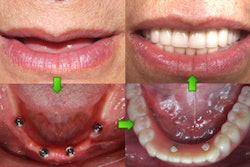The all-on-four dental implant treatment concept appears to be successful in the short term, according to a new systematic review in Clinical Implant Dentistry and Related Research (April 5, 2013).
But more research is needed to determine long-term clinical outcomes for this treatment approach, noted the study authors, from University Hospital in Freiburg, Germany, and the University of Maryland, Baltimore.
The study was designed to evaluate the all-on-four concept with regard to survival rates of the implants, applied fixed dental prostheses (FDPs), and temporal changes in proximal bone levels.
The researchers performed a systematic review of publications in English and German using database Medline, the Cochrane Library, and Google, and conducted hand searches of the bibliographies of related journals and systematic reviews. They initially identified 487 studies, but only 13 met the inclusion criteria.
From these studies, the researchers found that 4,804 implants were initially placed, of which 74 failed, with a majority of the failures (74%) occurring within the first 12 months. A total of 1,201 prostheses were incorporated within 48 hours after the surgery. The major prosthetic complication was the fracture of the all-acrylic FDP. The average bone loss was 1.3 ± 0.4 mm (36 months).
"The available data provide promising short-term results for the all-on-four treatment approach," the study authors concluded. "However, current evidence is limited by the quality of available studies and the paucity of data on long-term clinical outcomes of five years or greater."



















